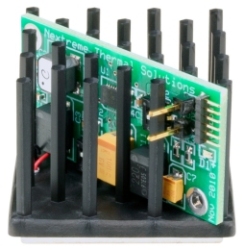Feb 22 2011
Nextreme Thermal Solutions has launched Thermobility that converts heat to electricity for wireless applications that consume less power. The device deploys thin-film thermoelectric technology to change heat to electricity for compact, autonomous solutions.
 Nextreme Thermobility
Nextreme Thermobility
The device deploys temperature alterations to facilitate power generation without wires in the presence of adequate heat. It does not need wired power sources or batteries that need to be replaced at regular intervals. It can provide power on a long term basis without needing constant maintenance, when it is used with unconnected transmitters. This makes for its use in industrial control, transportation, automotive and construction control.
The WPG-1 offers a voltage output of 3.3, 4.1 or 5.0 VDC to electrical loads of 15kÙ or more. It looks like a golf ball and has a pin-fin heat sink, a circuit board, the eTEG HV56 thermoelectric power generator and a metal plate that conveys heat. It has a LTC3108 Ultralow Voltage Step-Up Converter and Power Manager chip for 1mW electricity at 15-20K relative to ambient temperature.
It can be used with flat heat sources such as a laboratory hotplate with temperature control. The circuit board includes DIP switches for output voltage. Electrical connections can be made with the on-board connectors.